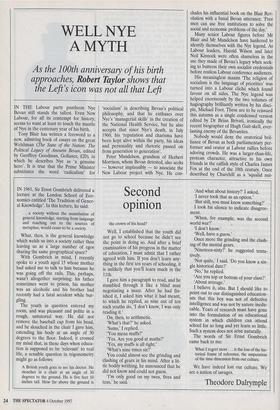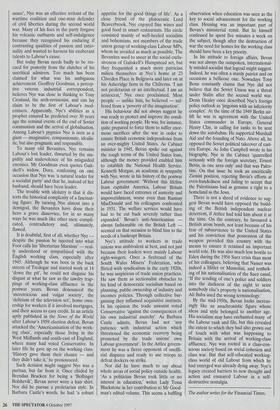WELL NYE A MYTH
As the 100th anniversary of his birth the Left's icon was not all that Left
IN THE Labour party pantheon Nye Bevan still stands the tallest. Even New Labour, for all its contempt for history, seems to want at least to touch the mantle of Nye in the centenary year of his birth.
Tony Blair has written a foreword to a new, admiring book of essays on the great Welshman (The State of the Nation: The Political Legacy of Aneurin Bevan, edited by Geoffrey Goodman, Gollancz, 120), in which he describes Nye as 'a genuine hero'. It is true that the Prime Minister substitutes the word 'radicalism' for 'socialism' in describing Bevan's political philosophy, and that he enthuses over Nye's 'managerial skills' in the creation of the National Health Service, but he also accepts that since Nye's death, in July 1960, his 'reputation and charisma have been kept alive within the party, his ideas and personality and rhetoric passed on from generation to generation'.
Peter Mandelson, grandson of Herbert Morrison, whom Bevan detested, also seeks — however implausibly — to associate the New Labour project with Nye. He con- dudes his influential book on the Blair Rev- olution with a banal Bevan utterance: 'Free men can use free institutions to solve the social and economic problems of the day.'
Many senior Labour figures before Mr Blair and Mr Mandelson have hankered to identify themselves with the Nye legend. As Labour leaders, Harold Wilson and later Neil 1Cinnock were often shameless in the use they made of Bevan's legacy when seek- ing to buttress their own socialist credentials before restless Labour conference audiences.
His meaningless maxim 'The religion of socialism is the language of priorities' was turned into a Labour cliché which found favour on all sides. The Nye legend was helped enormously by the two volumes of hagiography brilliantly written by his disci- ple, Michael Foot. These are to be reissued this autumn as a single condensed version edited by Dr Brian Brivati, ironically the recent biographer of Hugh Gait-skell, ever- lasting enemy of the Bevanites.
Nobody would deny the oratorical bril- liance of Bevan as both parliamentary per- former and orator at Labour rallies before adoring crowds. He was a larger-than-life, protean character, attractive to his own friends in the raffish style of Charles James Fox at the end of the 18th century. Once described by Churchill as a 'squalid nui- sance', Nye was an effective irritant of the wartime coalition and one-man defender of civil liberties during the second world war. Many of his foes in the party forgave his volcanic outbursts and self-indulgence because they recognised his enduring if contrasting qualities of passion and ratio- nality and wanted to harness his exuberant talents to Labour's cause.
But today Bevan needs badly to be res- cued for posterity from the clutches of his uncritical admirers. Too much has been claimed for what was his ambiguous achievement. Geoffrey Goodman, a percep- tive veteran industrial correspondent, believes Nye was close in thinking to Tony Crosland, the arch-revisionist, and can lay claim to be the first of Labour's mod- ernisers. Apparently, Nye's abilities as a prophet ensured he predicted over 30 years ago the seminal events of the end of Soviet communism and the arrival of globalisation. Among Labour's pygmies Nye is seen as a giant — imaginative, compassionate, idealis- tic, but also pragmatic and responsible.
To many old Bevanites, Nye remains Labour's lost leader, thwarted by the stu- pidity and malevolence of his misguided enemies. Mr Goodman even quotes Gait- skell's widow, Dora, confessing on one occasion that Nye was 'a natural leader for a socialist party' and that he, instead of her husband, should have been leader.
The trouble with idolatry is that it dis- torts the historical complexity of a fascinat- ing figure. By turning Nye almost into a demigod, the Bevanites have done their hero a grave disservice, for in so many ways he was much like other men: compli- cated, contradictory and, ultimately, flawed.
It is doubtful, first of all, whether Nye — despite the passion he injected into what Foot calls his 'libertarian Marxism' — real- ly understood or sympathised with the English working class, especially after 1945. Although he was born in the back streets of Tredegar and started work at 14 'down the pit', he could not disguise his disgust at what he saw as the tawdry trap- pings of working-class affluence in the postwar years. Bevan denounced the 'meretricious and vulgar society', the 'delirium of the television set', home own- ership for workers if it involved mortgages, and their access to easy credit. In an article aptly published in the News of the World after Labour's 1959 election defeat, Bevan attacked the 'Americanisation of the work- ing class', especially those living in the West Midlands and south-east of England, where many had voted Conservative. In later life he gave up on the working class. 'History gave them their chance — and they didn't take it,' he pronounced.
Such derision might suggest Nye was a puritan, but far from it. Once chided by Brendan Bracken for being a 'Bollinger Bolshevik', Bevan never wore a hair shirt. Nor did he pursue a proletarian style. In Barbara Castle's words, he had 'a robust appetite for the good things of life'. As a close friend of the plutocratic Lord Beaverbrook, Nye enjoyed fine wines and good food in smart restaurants. His circle consisted mainly of well-heeled socialists and bohemians, not members of the trade union group of working-class Labour MPs, whom he avoided as much as possible. The Bevanites used to sneer at the social exclu- siveness of Gaitskell's Hampstead set, but they frequented a much more patrician milieu themselves at Nye's home at 23 Cliveden Place in BeIgravia and later on at his Asheridge farm in the Chilterns. 'I am not proletarian or an intellectual. I am an aristocrat,' Nye once proclaimed. Most people — unlike him, he believed — suf- fered from a 'poverty of the imagination'.
His behaviour did not always suggest he was ready to protect and improve the condi- tion of working people. He was, for instance, quite prepared to force them to suffer enor- mous sacrifices after the war in order to ensure British economic independence from an over-mighty United States. As Cabinet minister in 1945, Bevan spoke out against the tough terms of the United States loan, although the money provided enabled him to establish the National Health Service. Kenneth Morgan, an academic in sympathy with Nye, wrote in his history of the postwir Labour government: 'Without this lifeline from capitalist America, Labour Britain would have faced extremes of austerity and impoverishment, worse even than Ramsay MacDonald and his colleagues confronted in 1931. The welfare services would have had to be cut back severely rather than expanded.' Bevan's anti-Americanism — always fashionable on the British Left — seemed on that occasion to blind him to the needs of a bankrupt Britain.
Nye's attitude to workers in trade unions was ambivalent at best, and not just because their leaders were mainly Labour right-wingers. Once a firebrand of the South Wales Miners' Federation, who flirted with syndicalism in the early 1920s, he was suspicious of trade union practices. He saw them as sectionalist obstacles to his kind of democratic socialism based on planning, public ownership of industry and incomes policies. Through collective bar- gaining they inflamed acquisitive instincts. In his opinion the trade unionist voted Conservative 'against the consequences of his own industrial anarchy'. As Barbara Castle admits, Bevan had not 'any patience with industrial action which threatened the economic recovery being promoted by the trade unions' own Labour government'. In the Attlee govern- ment he was a fierce opponent of unoffi- cial disputes and ready to use troops to defeat dockers on strike.
Nor did he have much to say about whole areas of social policy outside health. 'As a politician Bevan took little or no interest in education,' writes Lady Tessa Blackstone in her contribution to Mr Good- man's edited volume. This seems a baffling observation when education was seen as the key to social advancement for the working class. Housing was an important part of Bevan's ministerial remit. But he himself confessed he spent five minutes a week on the subject, though after the destruction of war the need for homes for the working class should have been a key priority.
In his attitude to foreign affairs, Bevan was not always the outspoken, international- ly minded socialist that legend might suggest. Indeed, he was often a sturdy patriot and on occasions a bellicose one. Nowadays Tony Bean constantly claims that Nye did not believe that the Soviet Union was a threat under Stalin after the second world war. Denis Healey once described Nye's foreign policy outlook as 'jingoism with an inferiority complex'. At the time of the 1949 Berlin air- lift he was in agreement with the United States commander in Europe, General Henry Clay, in calling for tanks to be sent down the autobahns. He supported Marshall Aid and the founding of Nato. Above all, he opposed the Soviet political takeover of east- ern Europe. As John Campbell wrote in his biography, Nye in the Cabinet 'quarrelled seriously with the foreign secretary, Ernest Bevin, in one area only' and that was Pales- tine. On that issue he took an uncritically Zionist position, rejecting Bevin's efforts at even-handedness and failing to accept that the Palestinians had as genuine a right to a homeland as the Jews.
There is not a shred of evidence to sug- gest Bevan would have opposed the build- ing of the British independent nuclear deterrent, if Attlee had told him about it at the time. On the contrary, he favoured a British atom bomb, not least because of his fear of subservience to the United States and his conviction that possession of the weapon provided this country with the means to ensure it retained an important world role. He was also much less hostile to Eden during the 1956 Suez crisis than most of his colleagues, believing that Nasser was indeed a Hitler or Mussolini, and renfark- ing of his nationalisation of the Suez canal, `If the sending of one's police and soldiers into the darkness of the night to seize somebody else's property is nationalisation, Ali Baba used the wrong terminology.'
By the mid-1950s, Bevan looks increas- ingly like an anachronistic figure whose ideas and style belonged to another age. His socialism may have enchanted many of the Labour rank and file, but this revealed the extent to which they had also grown out of touch with what was happening to Britain with the arrival of working-class affluence. Nye was rooted in a class-con- scious society based on social cohesion and class war. But that self-educated working- class world of old Labour from which he had emerged was already dying away. Nye's legacy created barriers to new thought and action and ensnared Labour in a self- destructive nostalgia.
The author writes for the Financial Times.











































































 Previous page
Previous page